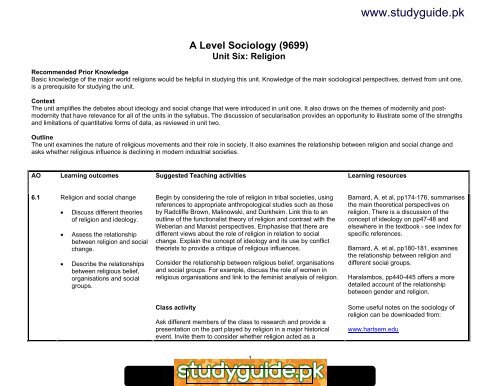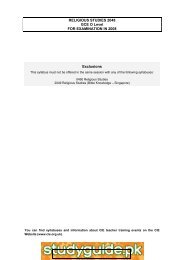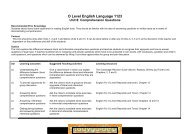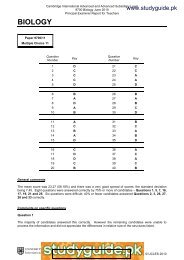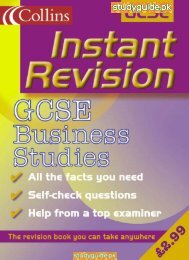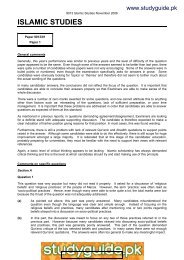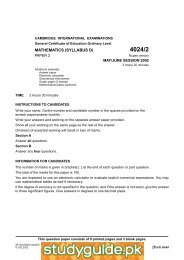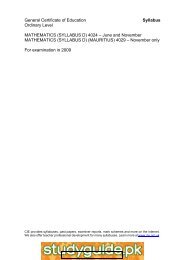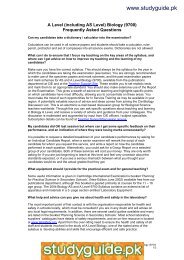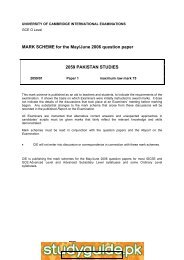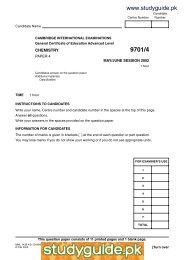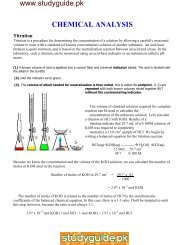A Level Sociology 9699 - StudyGuide.PK
A Level Sociology 9699 - StudyGuide.PK
A Level Sociology 9699 - StudyGuide.PK
Create successful ePaper yourself
Turn your PDF publications into a flip-book with our unique Google optimized e-Paper software.
www.studyguide.pk<br />
A <strong>Level</strong> <strong>Sociology</strong> (<strong>9699</strong>)<br />
Unit Six: Religion<br />
Recommended Prior Knowledge<br />
Basic knowledge of the major world religions would be helpful in studying this unit. Knowledge of the main sociological perspectives, derived from unit one,<br />
is a prerequisite for studying the unit.<br />
Context<br />
The unit amplifies the debates about ideology and social change that were introduced in unit one. It also draws on the themes of modernity and postmodernity<br />
that have relevance for all of the units in the syllabus. The discussion of secularisation provides an opportunity to illustrate some of the strengths<br />
and limitations of quantitative forms of data, as reviewed in unit two.<br />
Outline<br />
The unit examines the nature of religious movements and their role in society. It also examines the relationship between religion and social change and<br />
asks whether religious influence is declining in modern industrial societies.<br />
AO Learning outcomes Suggested Teaching activities Learning resources<br />
6.1 Religion and social change<br />
• Discuss different theories<br />
of religion and ideology.<br />
• Assess the relationship<br />
between religion and social<br />
change.<br />
• Describe the relationships<br />
between religious belief,<br />
organisations and social<br />
groups.<br />
Begin by considering the role of religion in tribal societies, using<br />
references to appropriate anthropological studies such as those<br />
by Radcliffe Brown, Malinowski, and Durkheim. Link this to an<br />
outline of the functionalist theory of religion and contrast with the<br />
Weberian and Marxist perspectives. Emphasise that there are<br />
different views about the role of religion in relation to social<br />
change. Explain the concept of ideology and its use by conflict<br />
theorists to provide a critique of religious influences.<br />
Consider the relationship between religious belief, organisations<br />
and social groups. For example, discuss the role of women in<br />
religious organisations and link to the feminist analysis of religion.<br />
Class activity<br />
Ask different members of the class to research and provide a<br />
presentation on the part played by religion in a major historical<br />
event. Invite them to consider whether religion acted as a<br />
Barnard, A. et al, pp174-176, summarises<br />
the main theoretical perspectives on<br />
religion. There is a discussion of the<br />
concept of ideology on pp47-48 and<br />
elsewhere in the textbook - see index for<br />
specific references.<br />
Barnard, A. et al, pp180-181, examines<br />
the relationship between religion and<br />
different social groups.<br />
Haralambos, pp440-445 offers a more<br />
detailed account of the relationship<br />
between gender and religion.<br />
Some useful notes on the sociology of<br />
religion can be downloaded from:<br />
www.hartsem.edu<br />
1<br />
www.xtremepapers.net
www.studyguide.pk<br />
AO Learning outcomes Suggested Teaching activities Learning resources<br />
conservative force or a dynamic for change in the example under<br />
review. Link the presentations to a summary of the main<br />
sociological perspectives on religion and its relationship to social<br />
change.<br />
For detailed information about Weber's<br />
theory of religion, see:<br />
www.ne.jp/asahi/moriyuki/abukuma<br />
6.2 Religious movements<br />
• Distinguish between cults,<br />
sects, denominations and<br />
churches.<br />
• Assess the secularisation<br />
thesis.<br />
• Discuss the relationships<br />
between religious<br />
fundamentalism, modernity<br />
and post-modernity.<br />
Begin by defining the different forms of religious organisations,<br />
including churches, denominations, sects and cults. Discuss the<br />
reasons for the growth of sects and new religious movements.<br />
Move on to the secularisation debate, reviewing the evidence for<br />
and against the idea that religious influence is declining in modern<br />
industrial societies. Point out the difficulty of defining religion and<br />
the problems involved in measuring religious belief and<br />
commitment. Consider examples of religious revivalism, such as<br />
new wave Christianity in the USA and western Europe.<br />
Use examples to illustrate the meaning of religious<br />
fundamentalism and consider the reasons for the apparent<br />
resurgence in this form of religious practice in both Christianity<br />
and Islam. Link to the discussion about the transition from<br />
modernity to post-modernity and the processes of globalisation in<br />
particular.<br />
Class activity<br />
Invite the class to design a simple survey that could be used for<br />
assessing the extent of religiosity in their society. Discuss the<br />
potential problems in designing the survey and formulating<br />
appropriate questions. Link to an assessment of the strengths and<br />
limitations of the empirical data used by sociologists on both sides<br />
of the secularisation debate.<br />
Barnard, A. et al, pp177-180,<br />
distinguishes between church,<br />
denomination and sect. The arguments<br />
for and against the secularisation thesis<br />
are examined on pp181-186<br />
Barnard, A. et al, pp186-187 discusses<br />
religious fundamentalism and its links with<br />
post-modernity.<br />
Haralambos, pp495-501, provides an<br />
excellent summary of recent contributions<br />
to the <strong>Sociology</strong> of Religion from a postmodernist<br />
perspective.<br />
The Classic Collection video, Eileen<br />
Barker on The Making of a Moonie,<br />
provides an excellent case study for<br />
discussing cults and their relationship to<br />
established religious organisations.<br />
An excellent source for information about<br />
different religious movements is:<br />
http://religiousmovements.lib.virginia.edu/<br />
2<br />
www.xtremepapers.net


